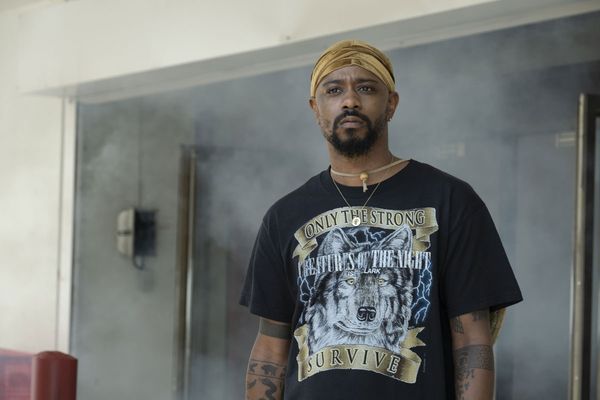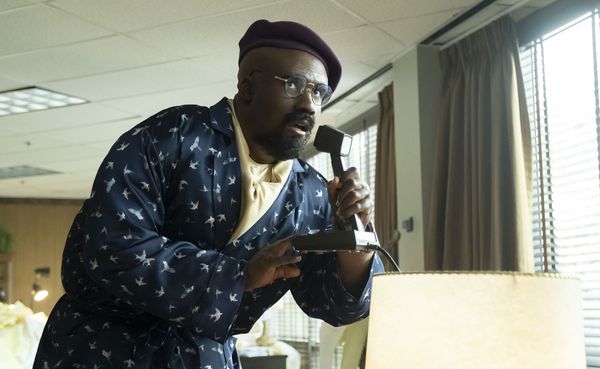
When "Atlanta" creator Donald Glover told journalists attending a recent Television Critics Association press conference that the theme for the show's final season is "have more fun," describing it as the most grounded of the four, he wasn't hiding any spoilers.
This season is straightforwardly fun, exuding the spirit that launched the show and re-establishing Atlanta, Georgia as a state of mind, not just a place.
Nevertheless, the real meal is not in the surface plot, but in the show's secondary or tertiary messages. The eighth episode, "The Goof Who Sat By the Door," is the finest example of this.
Most of the season follows Glover's character Earn; his cousin Al (Bryan Tyree Henry); their friend, sage and confidante Darius (LaKeith Stanfield); and Earn's on-and-off love Van (Zazie Beetz) on various missions. But this standalone faux-documentary presents an alternate history in which The Walt Disney Company votes in its first Black CEO, Thomas "Tom" Washington's (Eric Berryman).
According to the script written by Francesca Sloane and Karen Joseph Adcock, Washington is responsible for making Disney's Blackest movie ever. No, not "The Lion King" – "A Goofy Movie."
To know Glover is to know there are layers of truth within a story that is mostly cut out of whole cloth. The concept springs from Glover's awareness of online culture and memes, including the stature "A Goofy Movie" holds among Black millennial nerds.
The 1995 animated movie follows Goofy and his good-natured son Max, whose school principal warns Goofy that Max is going to end up in the electric chair. In the "Goofy" revisioning, Washington sees the movie as means of establishing and reclaiming Goofy's Blackness.
The writers' fervor for experimentation ... makes this show one of the few places on TV where anything can happen.
This assumption is based in fact. Within the story, the writers and Glover, who directs the episode, include an actual (and racist) quote from Goofy's creator, the animator Art Babbitt.
"Think of the Goof as a composite of an everlasting optimist, a gullible Good Samaritan, a half-wit, a shiftless, good-natured colored boy, and a hick," Babbitt told his staff in 1934. "His brain is rather vapoury. He laughs at his own jokes because he can't understand any others. He is very courteous and apologetic and his faux pas embarrass him, but he tries to laugh off his errors."

The understanding is that this history isn't actual, but there's enough truth within to compel a person to read between the lines. In one scene, a friend of Washington's recalls him saying, "I'm not here for a long time, I'm here for a good time." What that meant to his confidante was that Washington knew he was going to be fired.
The same philosophy drives Glover and his creative team on "Atlanta." Fellow executive producer Stefani Robinson recalled at that same press conference that on their very first day of writing for the show, "Donald looked at all of us in the eye and said ... 'We're probably going to get canceled, so let's have fun.'"
To see "Atlanta" fire off a mic-dropper like this with merely two episodes left shouldn't surprise anyone. The writers' fervor for experimentation coupled with Hiro Murai's gauzy, fantastical directing style make this one of the few places on TV where anything can happen, and more often than not, the big swings work.
But like every other story in Season 4, "The Goof Who Sat By the Door" circles back to where "Atlanta" began. The fake documentary is airing on BAN, the fictional Black cable network from a season one killer that was equally a tribute to classic sketch comedies like "In Living Color" and a parody of BET.
The difference is that this version of the Black American Network is slicker than the public access-looking jokey-joke version seen in the first season. Like Earn, Alfred, Darius, and Van, it's working with a larger budget. What we'll never know is whether the audience in the "Atlanta" universe views it differently – which is another way of asking the unspoken question driving these final episodes.

If more people are connecting with the fourth season of "Atlanta" than the more conceptual, anthology-structured European tour that comprised its third, that's because the characters have returned home, mostly unchanged save for their wealth and influence. Glover shared in that press conference that he and the writers began in a place assuming that "no one cares about a lot of stuff."
Now, he says, the "Atlanta" family has grown up, and it's clear that people do care. But what does that mean for the characters? It varies. Al is now wealthy and famous, and he's still running for his life from people with beefs from back in the day. But since TikTok shortened the window for fame and relevance, he's also considered an elder statesman of the local hip-hop scene, if not obsolete. The season begins with him finding out that one of his biggest heroes in the local rap scene died, and for reasons you should see for yourself, few mourned him.
Money brings them more comfort and ease, but there's also a real awareness that the power it brings is finite.
Darius moves through life in a state of rarely perturbed Zen, but Earn can't, despite having enough money to dump tens of thousands of dollars into ruining a stranger's life for completely petty reasons. In the same episode, he also goes to therapy, coming to terms with the reason he left Princeton, a story that was never told until this season.
That story explains a lot about why Earn is the person we've come to know, and why he's sabotaged his relationship with Van (although he stated, as clearly as he showed in Season 3, that he loves her).
Money brings them more comfort and ease, but there's also a real awareness that the power it brings is finite, and whatever it is that affords people this power is a hungry beast that demands constant feeding. The script handles that idea with a lighter touch through the core characters' arcs, going all-in for the fifth episode, "Work Ethic!, which shoves Van and her daughter Lottie inside a psychological thriller set on a production lot meant to parody Tyler Perry Studios.

But the "Atlanta" version of Tyler Perry is a media tycoon named Kirkwood Chocolate (Glover, encased in slightly less latex than in "Teddy Perkins"), who runs the place from inside a fortress. Chocolate is more clown than horror villain, but like Teddy Perkins, he symbolizes something larger.
Kirkwood lords over a TV and film factory that belches out a tawdry vision of Black culture designed to be palatable to mainstream audiences, but his sway is at its most potent inside the acreage he's carved out for himself. When Van finally gets to him, he's as human as the supposedly great-and-powerful Oz, a man subsisting in grits he eats from a mug. He's also massively successful because he meets the market's expectations for Black stories, knowing that even now, the bar is depressingly low.
This episode is also hilarious on its face, especially since the furious knit a punchline with which audiences are all too familiar and without specifically making Kirkwood Chocolate (or Tyler Perry by proxy) into a villain. He's simply happened on a successful by-the-numbers formula of which Van wants no part. The adventure that brings her to that conclusion is the braver burst of originality, and that's the larger point of the episode and the series itself.
Glover never allowed "Atlanta" to be pigeonholed in one genre or bought into delineations between so-called high art and supposedly disposable culture, allowing him and his creative partners to draw fertile inspiration from unlikely places. The show's "Robbin' Season," its critically acclaimed second, is loosely patterned on another Disney cartoon the "Tiny Toons Adventures" movie titled "How I Spent My Vacation," emulating the ways the cartoon characters' terror becomes comedy.
Even if you were unaware of that on first viewing, the tension, frustration and absurdity are relatable. That level of fearless creativity ensures "Atlanta" will be remembered and appreciated years after it's over — and that's a legacy that Glover and the fictional family he brought to life can take pride.
"Atlanta" airs Thursdays at 10 p.m. on FX, streaming the next day on Hulu.







